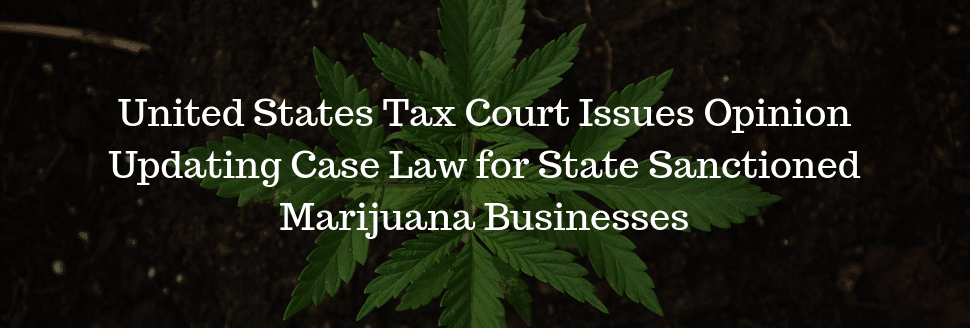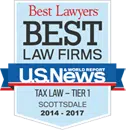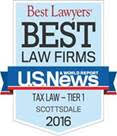Nevada Marijuana Businesses and Federal Income Tax Challenges Regarding Business Expense Deductions In 2001, the…
United States Tax Court Issues Opinion Updating Case Law for State Sanctioned Marijuana Businesses
On November 29, 2018, The United States Tax Court issued an opinion providing further guidance to state regulated marijuana businesses on the issues of business deductions, cost of goods sold, and whether a marijuana business operates a separate trade or business. Patients Mutual Assistance Collective Corp. d.b.a. Harborside Health Center v. Commissioner, 151 T.C. No. 11.

Harborside is a California medical marijuana business operating as a C Corporation, and according to the Tax Court, “may well be the largest marijuana dispensary in America.” Harborside also had other business activities including: the sale of non-marijuana products (branded shirts and hats); the sale of marijuana paraphernalia such as dabbing equipment and rolling papers; and the provision of therapeutic services (reiki, hypnotherapy, acupuncture, yoga, addiction treatment counseling, and support groups, e.g.).
By 2012, Harborside was generating total revenue of $25 million a year. But the federal government was watching. In 2012, the federal government filed a civil forfeiture action against Harborside in the U.S. District Court for the Northern District of California on the ground that Harborside’s property was subject to forfeiture because Harborside was using it to commit the distribution, cultivation, and possession of marijuana in violation of federal law. The lawsuit was ultimately dismissed with prejudice by stipulation of the parties.
Then, the IRS audited Harborside’s corporate tax returns (Forms 1120) for the tax years 2007 to 2012. By way of multiple notices of deficiency, the IRS denied most of Harborside’s claimed deductions and cost of goods sold for each of these tax years, and asserted tens of millions in tax deficiencies and accuracy related penalties. Harborside filed its Tax Court petitions in late 2011, which means that the cases were pending in Tax Court for close to seven years. As such, this latest opinion by the Tax Court (Judge Holmes) is a much anticipated and long overdue opinion for the marijuana industry.
Since the Tax Court’s 2007 opinion in CHAMPS, the Court has issued a number of opinions clarifying that section 280E precludes marijuana businesses from deducting their businesses expenses, but that they are entitled to “deduct” their cost of goods sold. Marijuana businesses may also deduct business expenses related to a second, ancillary business that is completely separate from the sale of marijuana. See Canna Care, Inc. v. Commissioner, T.C. Memo 2015-206.; see also Californians Helping to Alleviate Medical Problems, Inc., v. Commissioner, 128 T.C. 173 (2007) (“CHAMPS”); see also Alterman & Gibson v. Commissioner, T.C. Memo. 2018-83.
Harborside raised a set of new issues for the Tax Court to decide:
1. Whether res judicata precludes the IRS from arguing Harborside was engaged in trafficking in a controlled substance;
2. Whether Harborside’s business “consists of” trafficking in a controlled substance under section 280E;
3. Whether Harborside had more than one trade or business; and
4. What Harborside may include in its costs of goods sold.
Res Judicata
Harborside argued that the U.S. Attorney’s decision to dismiss the forfeiture action with prejudice meant that –as a matter of law– it was not a drug trafficker and was therefore not subject to section 280E.
Res judicata is an affirmative defense that bars suits on the same cause of action, and it applies to tax litigation. The rule states that:
When a court of competent jurisdiction has entered a final judgment on the merits of a cause of action, the parties to the suit and their privies are thereafter bound “not only as to every matter which was offered and received to sustain or defeat the claim or demand, but as to any other admissible matter which might have been offered for that purpose.”
Commissioner v. Sunnen, 333 U.S. 591, 597 (1948).
The problem for Harborside was that its Tax Court case was about its tax deficiencies, and the federal government could not have asserted these tax deficiencies as part of the civil forfeiture action. As such, the Tax Court held that Harborside’s tax issues did not arise from the same transactional nucleus of fact as the forfeiture lawsuit and res judicata did not apply.
Section 280E
Section 280E precludes a business from deducting expenses if the business “consists of” trafficking in controlled substances. So Harborside argued that section 280E applies only to businesses that exclusively or solely traffic in controlled substances and not to those that also engage in other activities.
Judge Holmes noted that the Court had summarily rejected this argument in Olive v. Commissioner, 139 T.C. 19 (2012), and could have done the same here. But given the importance of the case to the marijuana industry, he provided a more in-depth analysis (11 pages for those who wish to take a deeper dive). Ultimately though, Judge Holmes affirmed that section 280E denies business expense deductions to any trade of business that involves trafficking in controlled substances, even if that trade or business also engages in other activities.
More than One Trade or Business
According to CHAMP, even if section 280E precludes business expense deductions related to the sale of marijuana, the business may still deduct expenses for any separate, nontrafficking trades or businesses. CHAMP, 128 T.C. at 184-85. A single taxpayer can have more than one trade or business, CHAMP, 128 T.C. at 183, or multiple activities that nevertheless are only a single trade or business. Even separate businesses can be a single trade or business if they are part of a “unified business enterprise” with a single profit motive. Morton v. United States, 98 Fed. Cl. 596, 600 (2011). Harborside argued that it has four activities, each of which was a separate trade or business:
1. Sales of marijuana and products containing marijuana;
2. Sales of products with no marijuana;
3. Therapeutic services; and
4. Brand development.
Whether multiple activities are a single trade or business is a question of fact. Judge Holmes stated that to answer the question “we primarily consider ‘the degree of organizational and economic interrelationship of various undertakings, the business purpose which is (or might be) served by carrying on the various undertakings separately or together * * *, and the similarity of the various undertakings.’” Harborside, 151 T.C. No. 11 at 38 (citing Olive, 139 T.C. at 41; sec. 1.183-1(d), Income Tax Regs).
In deciding that Harborside did not have any separate trades or businesses from that of its marijuana sales, Judge Holmes made the following observations:
– Marijuana sales generated at least 98.7% of Harborside’s total revenue during each of the years at issue.
– Harborside’s sale of items that did not contain marijuana – such as branded clothing, hemp bags, books, and marijuana paraphernalia generated only 0.5% of its total revenue.
– No separate entity, management, books, or capital existed for Harborside’s non-marijuana sales.
– Harborside’s sales of items that were not marijuana were branded with Harborside’s logo or enabled the use of marijuana and were therefore not “substantially different” from the sale of marijuana itself.
– Harborside offered therapeutic services like in CHAMP, but these services were still incidental. Specifically, Harborside’s security employees spent only 5% of their time checking in people for services, while spending 60% of their time checking customers in who were there to buy marijuana.
– Harborside had business reasons to offer holistic services alongside its marijuana sales: the services “justified premium pricing and helped Harborside meet the community-benefit standards California law required.”
– Harborside’s “separate” brand development activity used the same entity, management, capital structure, employees, and facilities as its marijuana sales.
– Harborside dedicated the “lion’s share” of its resources to selling marijuana and marijuana products.
Cost of Goods Sold
Even though marijuana businesses cannot deduct business expenses, they don’t owe tax on their gross receipts. Taxpayers, even drug traffickers, pay tax only on gross income, which is gross receipts minus the cost of goods sold (COGS). Harborside, 151 T.C. No. 11 at 48. Deductions are subtractions from gross income that taxpayers make when they calculate their taxable income. COGS is the costs of acquiring inventory, through either purchase or production. Reading v. Commissioner, 70 T.C. 730, 733 (1978) (COGS is “expenditures necessary to acquire, construct or extract a physical product which is to be sold”).
The big difference between deductions and COGS is timing. Taxpayers can usually claim a deductible expense in the year they incur it. But when accounting for COGS they have to capitalize an item’s cost in the year of acquisition or production and either amortize it or wait until the year the item’s sold to make the corresponding adjustment to gross income.
Harborside, 151 T.C. No. 11 at 49-50 (citations omitted).
The issue in Harborside was what set of rules applies to COGS: section 471 or section 263A. The IRS argued that section 471 applies. Harborside argued that section 263A applied.
The Tax Court’s analysis on the interaction between section 471 and 263A is complex. In sum, the Court read the more favorable Section 263A out of the Internal Revenue Code with respect to marijuana businesses, and held that the Section 280E deductions disallowance prevents any additions to the cost of goods sold under the uniform capitalization rules of more recently enacted Section 263A. However, it is worth nothing that the Tax Court held that Harborside was a reseller, not a producer, and that producers are subject to a different set of regulations under Section 471 that allow additional expenses to be included in COGS. As such, while Harborside is an adverse precedent to the marijuana industry on COGS, it may not be the final word on the Section 263A question.
If you own a business selling, growing, or producing marijuana, you need to work with an experienced tax lawyer to understand your tax rights and responsibilities. The landscape is changing so quickly that you need a legal advocate on your side to help you navigate it all. If your business is audited and you don’t have detailed information about every single transaction, you risk forfeiting your COGS claim and you could be subject to penalties for filing an inaccurate tax return.
Silver Law PLC operates in Arizona and Nevada and all of its lawyers are former trial attorneys for the IRS. A tax lawyer from our team can help you understand how the complex Tax Code applies to your marijuana business operations. We’ll help you ensure that you are meeting your obligations. If you have been audited or are facing collections, we are also in a position to help you navigate that process. We can either find ways to bring down your tax debt or can negotiate a settlement for you. Call us today to talk with a tax lawyer and learn more.
Published by:
Silver Law PLC
7033 E Greenway Pkwy #200
Scottsdale, AZ 85254
Office: 480-429-3360
Silver Law PLC (Las Vegas)
410 S Rampart Blvd Suite 390
Las Vegas, NV 89145
Office: 702-318-7130
Email: lchapman@silverlawplc.com
Website: www.taxcontroversy.com
















Leave a Reply
You must be logged in to post a comment.